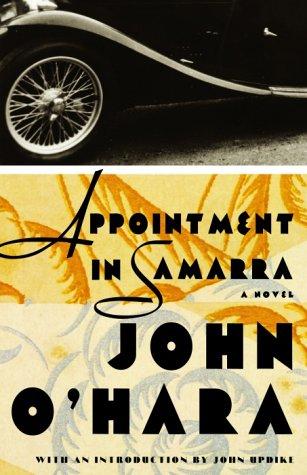Acton reviewed Appointment in Samarra by John O'Hara
Review of 'Appointment in Samarra' on 'Goodreads'
4 stars
"Appointment in Samarra", by John O'Hara, is the telling of how Julian English's life spirals out of his control in three days. On the first day, he throws a drink in the face of Harry Reilly, a man to whom he owes money. On the second day, he is openly unfaithful to his wife Caroline with the mistress of a gangster who has been good for English's Cadillac business. And finally, on the third, he gets into a very bad altercation at an eating club. He is drunk almost constantly during this time, which happens to be Christmas and the two days afterwards.
At the end of the story, I did not feel that any of his problems had to be the end of the world--given that he straighten up and fly straight--but Julian English is a depressed person and obviously a self-destructive one who has suicidal thoughts three times in this story before acting on it. And one part of his life that was probably irreparably damaged was his marriage; Caroline was dreadfully unhappy, and I got the feeling that she was finished with him.
I will interject my perception that the three days, three acts, and three suicidal thoughts in this story do seem to constitute a trinity theme, which may be a stylistic echo of Julian's discomfort with the Catholic community, of which Harry Reilly is member.
O'Hara prefaces his story with W. Sommerset Maugham's Death Speaks to very good effect. The reader knows that Julian English is fated to die and will not escape that fate. As Julian's father, Dr. William English, pronounces his son dead, he thinks of his own father. Julian's grandfather had also lead a destructive life that ended by his own hand, and so Dr. English is resigned to the belief that the suicide gene had jumped a generation, that this was Julian's time to die.
Meanwhile, other people react with surprise. Harry Reilly is astonished, and acknowledges that he knew Julian liked him. "He wouldn't borrow a nickel from me if he didn't like me." And later, "...I wonder what in God's name would make him do a thing like that?" Of course, we know that Reilly was plenty angry with English about the drink, which gave him a black eye, but this is an example of how some of Julian English's perceptions are wildly exaggerated. Tragically, it is this drunken insult to Reilly that sets him in downward motion, because he truly believes that Reilly is going to get back at him in some way that will ruin his livelihood. Julian's wife Caroline is shocked, traumatized, and aggrieved. This is not the ending she foresaw, but I got the feeling that she would eventually pick up the pieces and go on. It is impossible to escape the thought that, in the long run, Julian's suicide might have made her life easier.
"Appointmentin Samarra" is also a window into the historically fascinating time of prohibition, including the prejudices and social mores of that time, and is also of special interest to those familiar with the Lehigh Valley, in Pennsylvania. John O'Hara wrote his novel in an appealing third person narrative style with dialogue that seems very natural. But then, O'Hara knew the time and place very well, having been born in Pottsville, Pennsylvania in 1905.
This was a good read.

